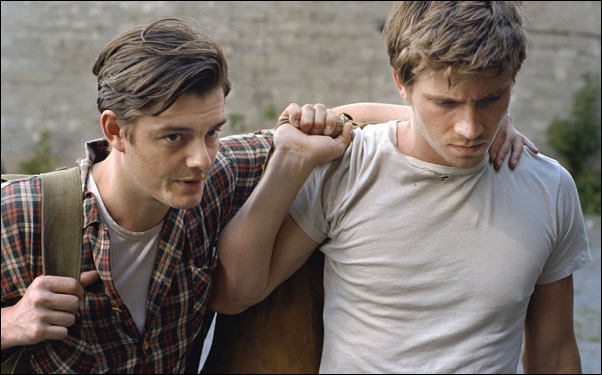It didn’t surprise me that after the Toronto premiere of “On the Road,” Walter Salles spoke of reading the Jack Kerouac novel before he embarked on his 2004 breakthrough “The Motorcycle Diaries.” It wasn’t the first time he read it, noting that at 18 when he first picked up a copy, it was an assurance that “all possibilities were endless” while living in Brazil where roads were physically closed. In fact, “On the Road” is a path he traveled before to some degree, using his treatment of Che Guevara’s early days, which wisely downplayed the legend of the future Cuban revolutionary while planting the ideas for what was to come, as a map for tackling one of the most hallowed works of American literature, refusing to be in awe of it.
That allows “On the Road,” a film that famously took Francis Ford Coppola over a decade to adapt before passing it on to his son Roman (now a producer on this version) and finally Salles, to breathe, though there are many moments where Salles’ treatment will leave you breathless. Like “Motorcycle Diaries,” the film is presented with immaculate technical skill, loaded with such a deep bench of talent that Jim Jarmusch’s accomplished longtime editor Jay Rabinowitz is listed as an assistant editor on the project. (“Dancer in the Dark” cutter François Gédigier gets top billing.) The result is an immersive retelling of Kerouac and Neal Cassady surrogates Sal and Dean’s travels through America, the latter on a quest to serve his unquenchable sexual appetite and the former with a similar thirst for new experiences to feed his writing. They’re joined at various times by Allen Ginsberg-esque poet Carlo Marx (Tom Sturridge) and Marylou (Kristen Stewart), the free spirit who loves them both.
Salles picks his spots to pull from the original text verbatim, but the film gets the musicality of the language down pat recited by actors who can carry the tune, augmented by the insistent rhythm of the editing. “On the Road” becomes a visual replication of a page-turner, with most scenes flitting past just long enough to make an impression of the jazz enjoyed, the drugs ingested and the fleeting relationships that its characters might later yearn to be permanent, all keeping at the feverish pace that Sal can commit it to paper.
There are casualties of this approach, including the appearances from Amy Adams and Terrence Howard, whose all-too brief cameos are one of the few things that call attention to the prestige of the production, and the overall power of certain scenes may be undercut by the desire to rush to the next. However, the totality of the world Salles and screenwriter Jose Rivera have created, along with the late ’40s era period detail that had to be created for even the smallest of scenes, is undeniably impressive.
The same certainly can be said for most of the actors, the leads in particular. Sam Riley, who was memorable in the Ian Curtis biopic “Control,” has the thankless task of serving as the story’s guide and does it admirably, still ceding much of the floor to Garrett Hedlund as Dean, whose toothy grin has been deployed in something other than the bland roles he’s been assigned previously in “Tron: Legacy” and “Troy.” Let loose, the actor is something of a discovery as the lone wolf, charismatic enough to keep the revolving door to his bedroom and his position in the driver’s seat unquestioned but wearing both the vulnerability and idealism that drives such pursuits on his face at all times.
Surprisingly, the film’s other revelation is Kristen Stewart, who has consistently proven her dramatic chops elsewhere, but shakes off any pent-up sexual frustration from the “Twilight” series or the appearance of androgyny that’s often been part of her previous work. So often punished for her sexuality that’s been limited to a curled lip or a pensive glance (even when she played a prostitute in “Welcome to the Rileys”), she is empowered by it here, heartbreakingly portraying a different kind of purity in the way she gives her love so freely. It makes the contrast between her and a reserved Kirsten Dunst as Dean’s wife Camille become more than the sidenote that it could’ve been in a lesser adaptation and while “On the Road” can feel overwhelming at times, it never itself is overwhelmed – by Kerouac’s sprawling prose, by the youthful exuberance of its cast or by its naturally unwieldy narrative. However, Salles’ “On the Road” brings this major work back to its original scale: small, intimate and still wild at heart.
“On the Road” premieres at the AFI Fest in Los Angeles tonight at 8 p.m at the Chinese Theater. It opens in New York and Los Angeles on December 21st before expanding into limited release in January.




